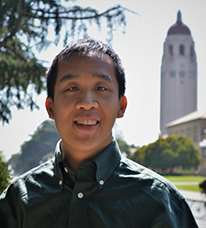
Dr. Jeremy Hsu
- Education:
- Harvard University, Bachelor of Arts
Stanford University, Ph.D.
Biography
Dr. Jeremy Hsu is a biology education researcher, with broad interests in several main areas: 1) assessment of student learning, 2) exploration of factors that influence this learning as well as student perceptions and attitudes, and 3) development of inquiry-based activities. His current research projects include exploring student and faculty experiences with office hours and academic advising, investigating how students transfer knowledge into new contexts, and studying the impact of assessment question framing on student attitudes.
Trained as an evolutionary geneticist, Dr. Hsu teaches various courses on evolution, molecular genetics, and more. He is passionate about teaching and science education and strives to incorporate active learning and evidence-based instructional practices in the classroom. He is also active in the local community, including as a board member of the Orange County Science and Engineering Fair.
Recent Creative, Scholarly Work and Publications
-
Clark N.*‡, and Hsu J.* 2023. Insight from biology program learning outcomes: Implications for teaching, learning, and assessment. CBE-Life Sciences Education 22(1). *authors contributed equally ‡Indicates undergraduate mentee
-
Goudsouzian L.K., and Hsu J. 2023. Reading primary scientific literature: Approaches for teaching students in the undergraduate STEM classroom. CBE-Life Sciences Education 22(3).
-
Forsythe D. ‡, and Hsu J. 2023. Neutral theory and beyond: A systematic review of molecular evolution education. Ecology and Evolution 13(8): e10365. ‡Indicates postdoctoral fellow mentee
-
Hsu J., Clark N‡, Hill K, and Rowland-Goldsmith M. 2023. Investigating the influence of assessment question framing on undergraduate biology student preference and affect. CBE-Life Sciences Education 22(4). ‡Indicates undergraduate mentee
-
Hsu J. 2023. An inquiry-based approach for teaching Type III functional responses in ecology. Teaching Issues and Experiments in Ecology, Vol. 13: Figure Set #9 [online].
-
Hsu J. 2022. Setting college students up for success. Science 377(6604): 376.
-
Hsu J., and Dudley L. 2022. Characterizing first-year biology majors’ motivations and perceptions of the discipline. Journal of Microbiology and Biology Education, e00134-22.
-
Hsu J., Rowland-Goldsmith M., and Schwartz E.B. 2022. Student motivations and barriers towards online and in person office hours in STEM courses. CBE-Life Sciences Education 21(4).
-
Hsu J., and Halpin P. 2022. Exploring physiology instructors' use of core concepts: Pedagogical factors that influence choice of course topics. Advances in Physiology Education 46(4): 667-676.
-
Hsu J. and Goldsmith G. 2021. Instructor strategies to alleviate student stress and anxiety among college and university STEM students. CBE-Life Sciences Education 20(1).
-
Hsu J. 2021. Promoting academic integrity and student learning in online biology courses. Journal of Microbiology and Biology Education 22(1): 22.1.17.
-
Hsu J., Lo S.M., and Sato B.K. 2021. Defining understanding: Perspectives from biology instructors and biology education researchers. The American Biology Teacher 83(6): 372-376.
-
Hsu J., Chen A., Cruz-Hinojoza E., Dinh-Dang D., Roth-Johnson E.A., Sato B.K., and Lo S.M. 2021. Characterizing biology education research: Perspectives from practitioners and scholars in the field. Journal of Microbiology and Biology Education 22(2): e00147-21.
-
Hsu J. Using primary literature on SARS-CoV-2 to promote student learning about evolution. 2020. Ecology and Evolution https://doi.org/10.1002/ece3.6501.
-
Hsu J., and Rowland-Goldsmith M. 2020. Student perceptions of an inquiry-based molecular biology lecture and lab following a mid-semester transition to online teaching. Biochemistry and Molecular Biology Education, 49(1): 15-25.
-
Hsu J., Imad M., and Wilson K. Furry with a chance of evolution: Exploring genetic drift with tuco-tucos. 2019. CourseSource. https://doi.org/10.24918/cs.2019.17
-
Furrow R.* and Hsu J.* Concept inventories as a resource for teaching evolution. 2019. Evolution: Education and Outreach 12(2). *authors contributed equally
-
Hsu J. A “choose-your-own-experiment” classroom-based activity that promotes scientific inquiry about RNA interference. 2019. Journal of Microbiology and Biology Education 20(3).
-
Hsu J. Using functional responses to investigate the ecological consequences of an introduced biological control agent. 2018. Teaching Issues and Experiments in Ecology, Vol. 13: Figure Set #1 [online].
-
Hsu J., Crawford J.C., Tammone M.N., Ramakrishnan U., Lacey E.A., and Hadly E.A. Genomic data reveal a loss of diversity in two species of tuco-tucos (genus Ctenomys) following a volcanic eruption. 2017. Scientific Reports 7: 16227.
-
Hsu J., Kam, S., Tammone, M., Lacey, E., and Hadly E. 2017. Rapid increase in genetic diversity in an endemic Patagonian tuco-tuco following a recent volcanic eruption. Journal of Mammalogy: 98 (3): 779-792.
-
Hsu J., Wrona A., Brownell S., and Khalfan W. 2016. The Explorations program: benefits of single-session, research- focused classes for students and postdoctoral instructors. J College Science Teaching 45(6): 78-86.
-
Solari K.A., Frank H.K.*, Frishkoff L.O.*, Hsu J.*, Kemp M.E.*, Mychajliw A.M.*, and Hadly E.A. 2016. Opportunity for some, extinction for others: the fate of species in the Anthropocene. Evolutionary Ecology Research 17: 787-813. *authors contributed equally
-
Zhan S., Zhang W., Niitepõld K., Hsu J., Haeger J.F., Zalucki M.P., Altizer S, de Roode J.C., Reppert S.M., and Kronforst M. 2014. The genetics of monarch butterfly migration and warning coloration. Nature 514: 317-321.